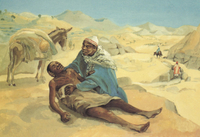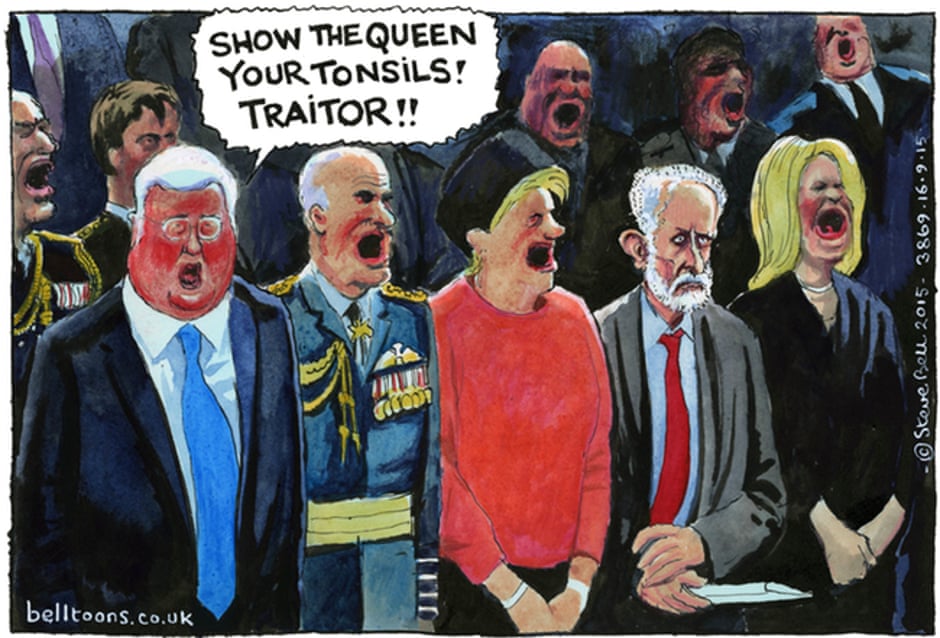_British_Museum.jpg) |
| The Ancient of Days (William Blake), image: Wikipedia |
We live in turbulent and unsettled times. Terrorist attacks across Europe – Nice, Brussels, Paris, Munich. Police violence and guns out of control in the US. The shootings at the gay nightclub in Orlando. Brexit. Violence in Pakistan and in Thailand. The rise of Donald Trump. The attempted coup and severe government response in Turkey. These disasters have been coming thick and fast this year. We scarcely mourn one when the next comes. And these are just the recent things. There’s climate change. War in Syria and Iraq. Economic hardships in so many places coupled with obscene levels of wealth in others. The refugee crisis. Food poverty in our rich country. And on and on. I’m sure most of us can think of others. This is a time where wild visions of the future, like Daniel’s dream, seem appropriate.
But it could be worse. We’re not living in an oppressed society. We’re not in a society which has been occupied for centuries by a series of increasingly nasty empires, with the current ruler trying to suppress our religion, to cut out the things which make us who we are as a people, to deny us our identity.
That was the situation of the Jewish people roughly 160 years before the birth of Christ. The pass-the-parcel of conquests of their fertile and strategically-location region had landed up with a Greek empire known as the Seleucid Empire, one of the successors to Alexander the Great. The king was increasingly repressive, denying them their religion, abolishing the Sabbath and even sacrificing a pig in the Temple, a thing of horror to Jews.
What could they do as a people to keep their identity? How could they think about God in this terrible situation? Some of them turned to prophetic voices and they constructed the book of Daniel, probably shaped from older legends of the time of the exiles in Babylon, but brought together in the tumultuous time of the Seleucid persecutions. Daniel was the last book to be written in what we call the Old Testament. And it contained all kinds of coded political messages. Oppressed peoples do that, especially in the heat of religious persecutions. When our nonconformist forebears were being persecuted by the English state in the 17th century, they produced all sorts of bizarre visions. And when in turn English Catholics were persecuted, they produced many hidden messages in books and songs – some say that the Twelve Days of Christmas is one such song.
This chapter of Daniel that we’ve heard today, as with the later chapters of the book, took the form that would later be called apocalyptic, the best-known example in the Bible being the book of Revelation. It was fiery. It was violent. It had bizarre imagery. It was deeply symbolic. And it was about the present day.
Because apocalyptic literature is always about the present day. It appears to be talking about the future, but for the most part it’s a symbolic commentary on the time when the book was written. The language of the vision & the four beasts is mysterious and has been interpreted in many ways, but probably refers to the four empires which controlled Israel for centuries – the Assyrian, Babylonian, Persian, Greek empires – with the present king, Antiochus IV, as the little horn who spoke arrogantly. (Apocalyptic interpretation is not an exact science - other commentators, from the historian Josephus to some modern millenarians, read the list differently and take Rome as the fourth beast.)
But it’s clear that Daniel’s vision of the four beasts is not to be taken literally – it’s a deeply symbolic vision. Apocalyptic literature never is. To me it’s a bit like science fiction, which is more often about the present than the future, and a bit like surrealist art, like Salvador Dali with his strange melting figures. It’s about the world, but in a strange coded way. If you stare at it too hard, for too long, you begin to go cross-eyed, but if you look from the side there’s wisdom in it.
The fact that Daniel 7 is well-loved as a passage by Christians isn’t so much to do with the beasts as the verses which follows them – the coming of the Ancient of Days, or the Ancient One, in splendour upon a flaming throne, followed by the one who is like a son of man. These verses are quoted in several places in the New Testament, and they form one of the standard readings on the day of Christ the King, the last Sunday of the church year, before Advent. From a Christian standpoint, and especially given the New Testament references, we read this in a very particular way – it’s about God and Jesus in their might and power.
And that’s not a bad interpretation. But like the rest of this chapter, it needs to be read with care. Now, the figure called the Ancient of Days is a pretty standard portrait of God the Father, with his long beard, flaming throne and surrounded by angels. Prophets such as Isaiah and Ezekiel had similar visions of God, and it’s close to the kind of image of God the Father that many of us carry at the back of our heads. We’ll end the service by singing to God who is immortal and invisible, calling him the Ancient of Days. But it’s an image, a metaphor – it’s not a reliable picture of God, who is beyond pictures. Indeed, in some branches of the church, especially among the Eastern Orthodox, the point is made that in the Old Testament, God is seen as too holy and too powerful to be observed by human beings, and that we only see him at a distance or through Jesus as God made human.
Our other character in the story, one who is like a Son of Man, comes with the clouds of heaven, is presented to the Ancient One, and is given eternal kingship. This figure is usually equated with Jesus, and Jesus quotes these verses more than once in the gospels, probably to refer to himself. Indeed, the phrase ‘son of man’ appears more than 80 times in the gospels – I counted them, or at least Bible Gateway did.
However, the phrase in Daniel, while it literally means son of man, is an Aramaic colloquialism which probably just means a human being. Much of the book of Daniel, including this chapter, was written in Aramaic, and this was also the language Jesus spoke with his disciples. Some commentators [notably Geza Vermes] have argued that Jesus calling himself the son of man is often just a somewhat elaborate way of saying “me”, a human being, a person.
That said, the term had huge resonance because of its appearance in Daniel 7, and the importance of the passage as a story of the deliverance of God’s people. But it wouldn’t have been read by Jews of the time the book was written, or of the time of Jesus, as referring to a single figure [as argued by NT Wright]. Rather, it refers to the vindication of the whole people of Israel. Because once the son of man appears and is granted his power, we don’t hear him mentioned again. But what we hear about are the “holy people of the most high”, generally reckoned to refer to the people of Israel, and in the vision it’s those holy ones who actually fight with the fourth beast. The passage ends with the Ancient of Days coming back to judge the beast in a kind of heavenly courtroom, find him at fault and put him down, and then he grants power to those holy ones.
No more mention of the son of man, but many mentions of these holy ones, and they end up being enthroned and given an everlasting kingdom. God’s righteous people, redeemed out of their oppression and brought to a position of victory.
Looked at it this way, Daniel 7 stops being a weird bit of mystery and becomes a deeply political statement. God will look at his people’s oppression, and he will act to prevent that oppression, to put down their oppressors, and to bring them justice. This is the call of the psalmist, who again and again calls to God from the place of oppression and asks for freedom. It is the call of Mary, who praised God when she heard she would give birth to the Messiah, proclaiming that God humbled the rich and lifted up the powerless. And it has been the cry of oppressed peoples throughout history – of the black slaves in the United States, looking to God as liberator; of the South Africans under apartheid who sang that freedom is coming; of the South Americans faced with repressive dictatorships who looked to God’s preferential option for the poor. In many cases these people looked more to the book of Exodus, with its cry of “let my people go” than to Daniel, but they would have found a similar message here.
Preachers are often taught to ask the question about a piece of scripture, even a complex one like this – what is the good news in this passage? Well, I can tell you plainly – for those in oppressed places, suffering under the yoke of hardship, suffering from discrimination for their gender or their sexuality or their racial origin, suffering from violence in its many forms, suffering from all the many ways that societies fail to see the love in God in those around them – for those people there is good news in this passage in abundance. God sees the beast, with its horn that speaks with such arrogance, and God says – no! I will not tolerate this! I will not tolerate injustice, or violence, or discrimination. I am the Lord your God, and I have spoken. I will pull down those evil-doers from their thrones, and instead raise up the holy ones of God to be rulers of the kingdom for ever.
But I’ve said already that apocalyptic literature is written by and for the oppressed. Yes we live in unsettled times, but what if we’re not ourselves oppressed? What if we are part of the problem? What of the times when we have colluded with violence, with discrimination, with injustice? What if we’re part of a system which enables these things to happen? Well it’s not such good news for us. Because God’s favour is with those who are oppressed, not with those who enable oppression to happen. And many of us, if we search our hearts, do enable oppression to happen.
I was fortunate enough to spend the day listening to the American preacher Rob Bell yesterday, and he was very clear on this matter. Churches, he said, need to ask themselves: who is oppressed in our area? Whose cry do we need to hear? Who in this area needs to hear the good news that God is on the side of the oppressed?
I don’t think this is a matter for equivocation. If God is on the side of the oppressed, so too must be the church, the body of Christ. St Teresa of Avila said that Christ has no hands but ours, no feet but ours. The church has no business in colluding with economic injustice, or racial violence, or gender discrimination, or homophobia. These are the things of the fourth beast. They are not the things of the holy ones of the most high. It is to the shame of the church when it has allowed these things to happen, or actively encouraged them. It is to the shame of the church when it still encourages them or allows them today.
Because we are not called upon as Christians to follow the authorities of this world. We are called to confess that Jesus is Lord. We are not called upon to have a king who has an earthly body and wears a crown and lives in a palace. We are called upon to give our allegiance to the king who was born in a stable and died on a rubbish heap, who gave his all so that we could experience the kingdom of God on this earth. So that we too could become among the holy ones of the most high, and could bring about the kingdom of God, where justice is experienced by all, and violence ceases, here on this earth of ours.
We worship a God who is beyond words and images, but we follow a king who came to earth as one like a son of man, and who will enable us to put aside our oppressors and to stop being oppressors ourselves, and to build the kingdom here and now. Praise be to God! Amen.








